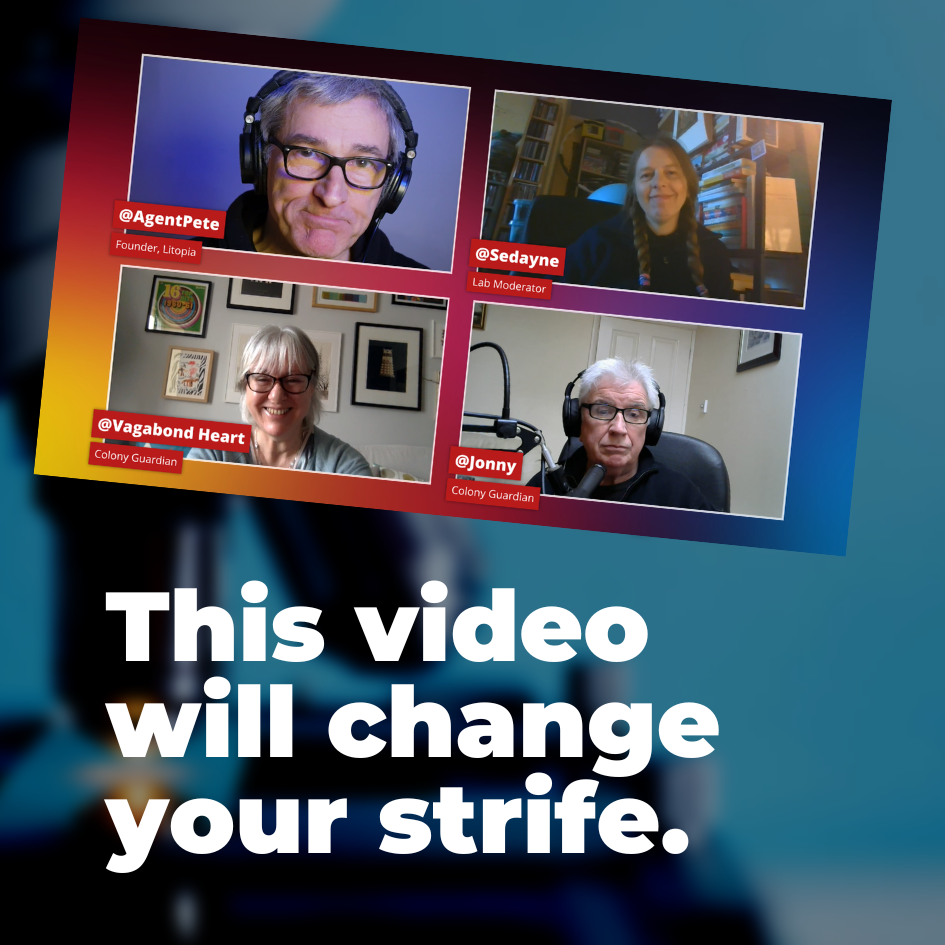- Feb 3, 2024
- LitBits
- 0
New blog post by Rachel McCarron – discussions in this thread, please
---
There has long been an association between mental illness and creativity with seemingly endless examples of successful creatives affected by anxiety, depression, bipolar and other mental disorders: F. Scott Fitzgerald, Edgar Allen Poe, Virginia Woolf, Leo Tolstoy, Sylvia Plath, Ernest Hemmingway, J.K. Rowling, Stephen King, Stephen Fry, Emily Dickinson, Franz Kafka, Matt Haig, Van Gogh, Degas, Michelangelo, Rothko, Goya, Kahlo, O’Keefe, Munch, Debbie Harry, Mick Jagger, Brian Wilson, Sinead O’Connor, Bruce Springsteen, Syd Barrett, Thom Yorke, Brian May, Kate Bush… And let us never forget the 27 Club. (https://en.wikipedia.org/wiki/27_Club) I am sure you can think of plenty more, and if I get started on a list of comedians, actors and filmmakers, we’ll be here all day.
The correlation between creativity and mental illness has been researched many times over many decades, but it’s unclear whether the creative mind is more susceptible to mental ill-health, or if the act of being creative increases the risk of illness.
In any case, it’s a lesson to those of us who indulge in creative behaviours; we must take care of our minds.
I had problems with depression and alcohol dependence in my twenties.
Spoiler alert: I survived, and thirty years on, I am doing okay.
It’s not an unusual or remarkable story; lots of people have mental health problems in their twenties. If you’re going to be mentally ill, it’s probably the best phase of life for it.
In my youth, I was a voracious reader and a compulsive writer. I wrote masses of stories and poems, although for me, songwriting was the drug of choice. Prolific from 1994-1997, I wrote hundreds of songs. Okay, most of them were utter drivel, but some were regularly requested in the places I played, and everyone sang along with the choruses.
Around that time, I was drinking heavily, whilst ensuring perfect A-grade assignments and passing all the clinical placements in my nurse training with flying colours. High achieving, high functioning. Always seeking the high. Forever crashing into low. Something had to give.
So, I ended up on Prozac (fluoxetine).
Prozac prevented my lows. But it took away my highs too. And I could no longer read fiction. I went from several books a week to being unable to focus on a single page. And I stopped writing altogether; my creative wave completely crashed.
It would be a dramatic lie to say that Prozac saved my life, but it enabled me to finish my training, and in that respect, it saved my clinical career. But the cost to my creativity was great.
I stopped drinking alcohol in 2001 and have been sober ever since.
I quit Prozac in 2005 – harder to get off than booze.
I didn’t start reading fiction again until ten years later. My dad got me a Kindle for Christmas 2014, and I decided I should make some use of it while I waited at his bedside in the hospice when he was slowly dying throughout October and November the following year. Station Eleven re-ignited my love for novels, and I’ve been trying to catch up on my reading ever since.
I’ve been an independent prescriber since 2010, and although Prozac is less commonly prescribed than in the 1990s, similar drugs are frequently used. I hate having to prescribe them. They have their place, and they will improve symptoms of depression for some people, but to get rid of the lows, you must sacrifice the highs. And these drugs aren’t without risk; anxiety, abnormal appetite, cardiac arrhythmias, sleep disorders, sexual dysfunction, depersonalisation, constipation, dry mouth, suicidal behaviour, vomiting, menstrual irregularities, malaise, sweating, yawning, altered taste, and tinnitus are just some of the known side effects. I recommend non-pharmacological interventions to my patients as well as, or instead of, medication.
• Talking therapies.
• Relaxation techniques and mindfulness.
• Optimising management of physical health conditions.
• Promoting good sleep habits without sedatives.
• Social support.
• Signposting for practical help (particularly if symptoms are caused by specific triggers like work, finances, addiction, living environment).
• Avoiding or reducing alcohol, smoking and substance use.
• Good nutrition.
• Fresh air, sunlight and exercise.
This last point may be Victorian-sounding advice, ignored by many, but incredibly effective if heeded.
I’ve been troubled with intermittent bouts of mild depression throughout my life, and some of the above strategies have enabled me to weather the storms without medication. But when the black clouds loomed darker in May 2022, I considered seeking a prescription.
I talked to one of my clinical colleagues. She didn’t tell me what to do, but she disclosed some details of her own experience that led me to consider something that had happened to me a long time ago, at the start of all the drinking, a few years before the relentless songwriting.
Instead of taking antidepressants, I started writing. And in writing, I unravelled what I needed to unravel.
It took me deeper for a while. But the dark places had a few beams of light, and at this distance, I was able to cope.
The novel I eventually wrote is in no way autobiographical, but it addresses themes of mental illness and loss, and through writing it, I climbed out of the hole I was in.
After five decades on this planet, I think I’m getting used to it.
Creativity and mental health are precariously interwoven. As writers, we need to take extremely good care of ourselves. We spend long hours alone with our notebooks or computers. Many of us are naturally introverted and socially shy. We may lack the support mechanisms that more outgoing and socially adept individuals have access to. We dwell on the emotional highs and lows of human experience because this is what makes good stories.
The good news is that creative activities have also been shown to enhance mental wellbeing, and this has certainly been my experience over the last few years.
So, let’s take care of ourselves and each other.
Fresh air, sunlight and exercise whenever possible.
Eat well. Sleep well.
Reach out and talk to someone when you need to.
And keep on writing.
If it gets too dark, share it with someone who can bring you some light. Litopia is very good for that.
Most of us will face mental illness at some point in our lives, either in ourselves or someone close. Some of you may be living with it now. Some of you may live with it your whole life. But I’ll tell you a secret: it gives you strength of character, and it makes you relatable. It probably makes you a better writer too.
If you have any thoughts or experiences that you are happy to share, please do so in the comments below.
• Has your mental health had an impact on your creative life?
• How has writing helped your mental wellbeing?
• What strategies do you use to safeguard and improve your mental health?
For more posts by Rachel McCarron click here
Get the discussion going – post your thoughts & comments in the thread below…
---
There has long been an association between mental illness and creativity with seemingly endless examples of successful creatives affected by anxiety, depression, bipolar and other mental disorders: F. Scott Fitzgerald, Edgar Allen Poe, Virginia Woolf, Leo Tolstoy, Sylvia Plath, Ernest Hemmingway, J.K. Rowling, Stephen King, Stephen Fry, Emily Dickinson, Franz Kafka, Matt Haig, Van Gogh, Degas, Michelangelo, Rothko, Goya, Kahlo, O’Keefe, Munch, Debbie Harry, Mick Jagger, Brian Wilson, Sinead O’Connor, Bruce Springsteen, Syd Barrett, Thom Yorke, Brian May, Kate Bush… And let us never forget the 27 Club. (https://en.wikipedia.org/wiki/27_Club) I am sure you can think of plenty more, and if I get started on a list of comedians, actors and filmmakers, we’ll be here all day.
The correlation between creativity and mental illness has been researched many times over many decades, but it’s unclear whether the creative mind is more susceptible to mental ill-health, or if the act of being creative increases the risk of illness.
In any case, it’s a lesson to those of us who indulge in creative behaviours; we must take care of our minds.
Thursday October 10th 2024 is World Mental Health Day
I had problems with depression and alcohol dependence in my twenties.
Spoiler alert: I survived, and thirty years on, I am doing okay.
It’s not an unusual or remarkable story; lots of people have mental health problems in their twenties. If you’re going to be mentally ill, it’s probably the best phase of life for it.
In my youth, I was a voracious reader and a compulsive writer. I wrote masses of stories and poems, although for me, songwriting was the drug of choice. Prolific from 1994-1997, I wrote hundreds of songs. Okay, most of them were utter drivel, but some were regularly requested in the places I played, and everyone sang along with the choruses.
Around that time, I was drinking heavily, whilst ensuring perfect A-grade assignments and passing all the clinical placements in my nurse training with flying colours. High achieving, high functioning. Always seeking the high. Forever crashing into low. Something had to give.
So, I ended up on Prozac (fluoxetine).
Prozac prevented my lows. But it took away my highs too. And I could no longer read fiction. I went from several books a week to being unable to focus on a single page. And I stopped writing altogether; my creative wave completely crashed.
It would be a dramatic lie to say that Prozac saved my life, but it enabled me to finish my training, and in that respect, it saved my clinical career. But the cost to my creativity was great.
I stopped drinking alcohol in 2001 and have been sober ever since.
I quit Prozac in 2005 – harder to get off than booze.
I didn’t start reading fiction again until ten years later. My dad got me a Kindle for Christmas 2014, and I decided I should make some use of it while I waited at his bedside in the hospice when he was slowly dying throughout October and November the following year. Station Eleven re-ignited my love for novels, and I’ve been trying to catch up on my reading ever since.
I’ve been an independent prescriber since 2010, and although Prozac is less commonly prescribed than in the 1990s, similar drugs are frequently used. I hate having to prescribe them. They have their place, and they will improve symptoms of depression for some people, but to get rid of the lows, you must sacrifice the highs. And these drugs aren’t without risk; anxiety, abnormal appetite, cardiac arrhythmias, sleep disorders, sexual dysfunction, depersonalisation, constipation, dry mouth, suicidal behaviour, vomiting, menstrual irregularities, malaise, sweating, yawning, altered taste, and tinnitus are just some of the known side effects. I recommend non-pharmacological interventions to my patients as well as, or instead of, medication.
• Talking therapies.
• Relaxation techniques and mindfulness.
• Optimising management of physical health conditions.
• Promoting good sleep habits without sedatives.
• Social support.
• Signposting for practical help (particularly if symptoms are caused by specific triggers like work, finances, addiction, living environment).
• Avoiding or reducing alcohol, smoking and substance use.
• Good nutrition.
• Fresh air, sunlight and exercise.
This last point may be Victorian-sounding advice, ignored by many, but incredibly effective if heeded.
I’ve been troubled with intermittent bouts of mild depression throughout my life, and some of the above strategies have enabled me to weather the storms without medication. But when the black clouds loomed darker in May 2022, I considered seeking a prescription.
I talked to one of my clinical colleagues. She didn’t tell me what to do, but she disclosed some details of her own experience that led me to consider something that had happened to me a long time ago, at the start of all the drinking, a few years before the relentless songwriting.
Instead of taking antidepressants, I started writing. And in writing, I unravelled what I needed to unravel.
It took me deeper for a while. But the dark places had a few beams of light, and at this distance, I was able to cope.
The novel I eventually wrote is in no way autobiographical, but it addresses themes of mental illness and loss, and through writing it, I climbed out of the hole I was in.
After five decades on this planet, I think I’m getting used to it.
Creativity and mental health are precariously interwoven. As writers, we need to take extremely good care of ourselves. We spend long hours alone with our notebooks or computers. Many of us are naturally introverted and socially shy. We may lack the support mechanisms that more outgoing and socially adept individuals have access to. We dwell on the emotional highs and lows of human experience because this is what makes good stories.
The good news is that creative activities have also been shown to enhance mental wellbeing, and this has certainly been my experience over the last few years.
So, let’s take care of ourselves and each other.
Fresh air, sunlight and exercise whenever possible.
Eat well. Sleep well.
Reach out and talk to someone when you need to.
And keep on writing.
If it gets too dark, share it with someone who can bring you some light. Litopia is very good for that.
1 in 4 people experience a mental health problem every year.
1 in 15 people attempt suicide over the course of their lifetime.
Most of us will face mental illness at some point in our lives, either in ourselves or someone close. Some of you may be living with it now. Some of you may live with it your whole life. But I’ll tell you a secret: it gives you strength of character, and it makes you relatable. It probably makes you a better writer too.
If you have any thoughts or experiences that you are happy to share, please do so in the comments below.
• Has your mental health had an impact on your creative life?
• How has writing helped your mental wellbeing?
• What strategies do you use to safeguard and improve your mental health?
If you feel overwhelmed and are struggling now, please talk to someone – a trusted friend or family member, or make an appointment with your GP or Advanced Practitioner.
Help is always available from Samaritans - Here to listen Tel: 116 123 (International number, based in the UK.)
Befrienders Worldwide - Global Suicide Prevention for support based in other countries
Get help or donate to http://www.mind.org.uk
---For more posts by Rachel McCarron click here
Get the discussion going – post your thoughts & comments in the thread below…
Last edited by a moderator:



